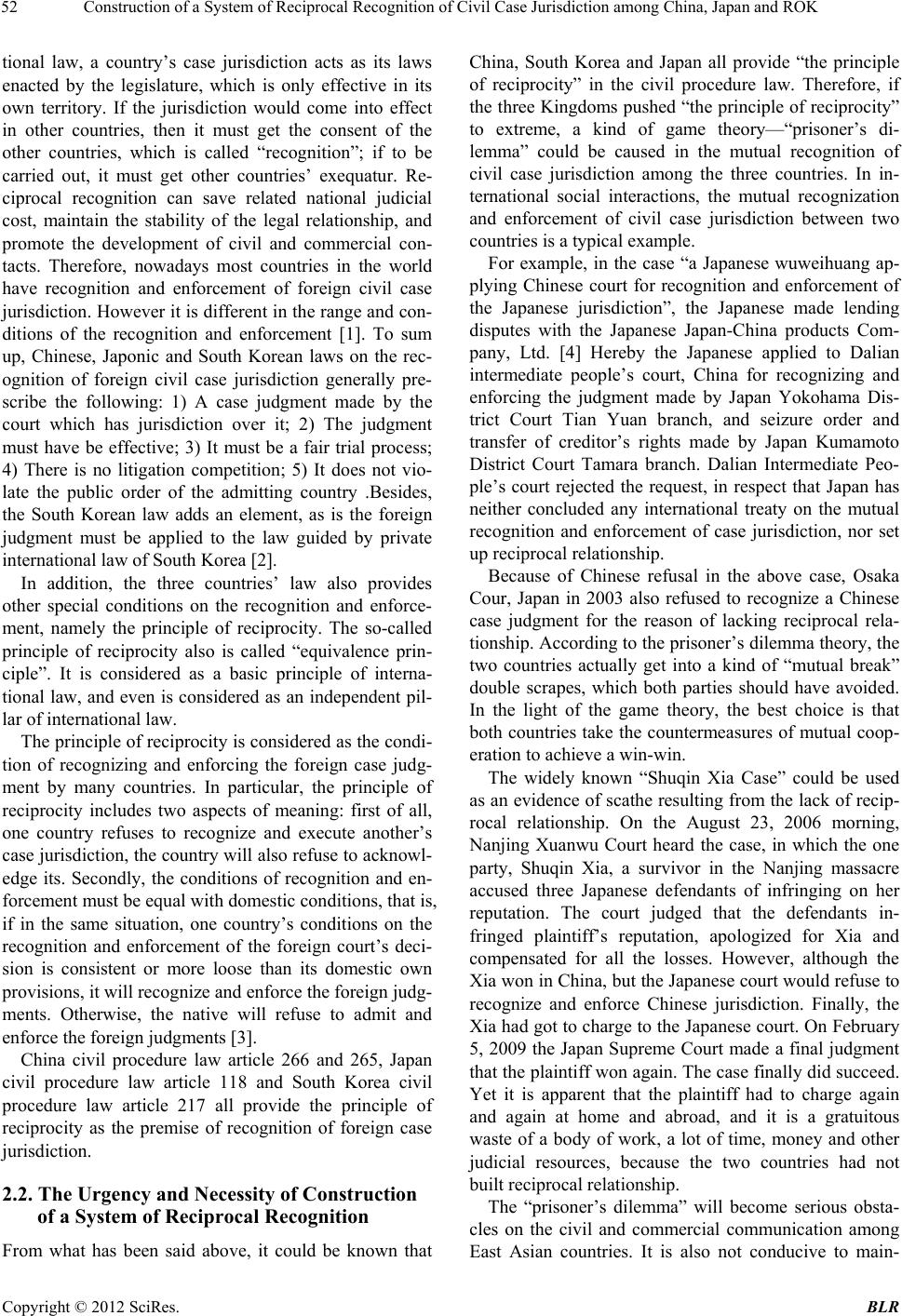
Construction of a System of Reciprocal Recognition of Civil Case Jurisdiction among China, Japan and ROK
52
tional law, a country’s case jurisdiction acts as its laws
enacted by the legislature, which is only effective in its
own territory. If the jurisdiction would come into effect
in other countries, then it must get the consent of the
other countries, which is called “recognition”; if to be
carried out, it must get other countries’ exequatur. Re-
ciprocal recognition can save related national judicial
cost, maintain the stability of the legal relationship, and
promote the development of civil and commercial con-
tacts. Therefore, nowadays most countries in the world
have recognition and enforcement of foreign civil case
jurisdiction. However it is different in the rang e and con-
ditions of the recognition and enforcement [1]. To sum
up, Chinese, Japonic and South Korean laws on the rec-
ognition of foreign civil case jurisdiction generally pre-
scribe the following: 1) A case judgment made by the
court which has jurisdiction over it; 2) The judgment
must have be effective; 3) It must be a fair trial process;
4) There is no litigation competition; 5) It does not vio-
late the public order of the admitting country .Besides,
the South Korean law adds an element, as is the foreign
judgment must be applied to the law guided by private
international law of South Korea [2].
In addition, the three countries’ law also provides
other special conditions on the recognition and enforce-
ment, namely the principle of reciprocity. The so-called
principle of reciprocity also is called “equivalence prin-
ciple”. It is considered as a basic principle of interna-
tional law, and even is considered as an independent pil-
lar of international law.
The principle of reciprocity is considered as the condi-
tion of recognizing and enforcing the foreign case judg-
ment by many countries. In particular, the principle of
reciprocity includes two aspects of meaning: first of all,
one country refuses to recognize and execute another’s
case jurisdiction, the country will also refuse to acknowl-
edge its. Secondly, the conditions of recognition and en-
forcement must be equal with domestic conditions, that is,
if in the same situation, one country’s conditions on the
recognition and enforcement of the foreign court’s deci-
sion is consistent or more loose than its domestic own
provisions, it will recognize and enforce the foreign judg-
ments. Otherwise, the native will refuse to admit and
enforce the foreign judgments [3].
China civil procedure law article 266 and 265, Japan
civil procedure law article 118 and South Korea civil
procedure law article 217 all provide the principle of
reciprocity as the premise of recognition of foreign case
jurisdiction.
2.2. The Urgency and Necessity of Construction
of a System of Reciprocal Recognition
From what has been said above, it could be known that
China, South Korea and Japan all provide “the principle
of reciprocity” in the civil procedure law. Therefore, if
the three Kingdoms pushed “the principle of reciprocity”
to extreme, a kind of game theory—“prisoner’s di-
lemma” could be caused in the mutual recognition of
civil case jurisdiction among the three countries. In in-
ternational social interactions, the mutual recognization
and enforcement of civil case jurisdiction between two
countries is a typical example.
For example, in the case “a Japanese wuweihuang ap-
plying Chinese court for recognition and enforcement of
the Japanese jurisdiction”, the Japanese made lending
disputes with the Japanese Japan-China products Com-
pany, Ltd. [4] Hereby the Japanese applied to Dalian
intermediate people’s court, China for recognizing and
enforcing the judgment made by Japan Yokohama Dis-
trict Court Tian Yuan branch, and seizure order and
transfer of creditor’s rights made by Japan Kumamoto
District Court Tamara branch. Dalian Intermediate Peo-
ple’s court rejected the request, in respect that Japan has
neither concluded any international treaty on the mutual
recognition and enforcement of case jurisdiction, nor set
up reciprocal relationship.
Because of Chinese refusal in the above case, Osaka
Cour, Japan in 2003 also refused to recognize a Chinese
case judgment for the reason of lacking reciprocal rela-
tionship. According to the prisoner’s dilemma theory, the
two countries actually get into a kind of “mutual break”
double scrapes, which both parties should have avoided.
In the light of the game theory, the best choice is that
both countries take the countermeasures of mutual coop-
eration to achieve a win-win.
The widely known “Shuqin Xia Case” could be used
as an evidence of scathe resulting from the lack of recip-
rocal relationship. On the August 23, 2006 morning,
Nanjing Xuanwu Court heard the case, in which the one
party, Shuqin Xia, a survivor in the Nanjing massacre
accused three Japanese defendants of infringing on her
reputation. The court judged that the defendants in-
fringed plaintiff’s reputation, apologized for Xia and
compensated for all the losses. However, although the
Xia won in China, but the Japanese court would refuse to
recognize and enforce Chinese jurisdiction. Finally, the
Xia had got to charge to the Japanese court. On February
5, 2009 the Japan Supreme Court made a final judgment
that the plaintiff won again. The case finally did succeed.
Yet it is apparent that the plaintiff had to charge again
and again at home and abroad, and it is a gratuitous
waste of a body of work, a lot of time, money and other
judicial resources, because the two countries had not
built reciprocal relationship.
The “prisoner’s dilemma” will become serious obsta-
cles on the civil and commercial communication among
East Asian countries. It is also not conducive to main-
Copyright © 2012 SciRes. BLR